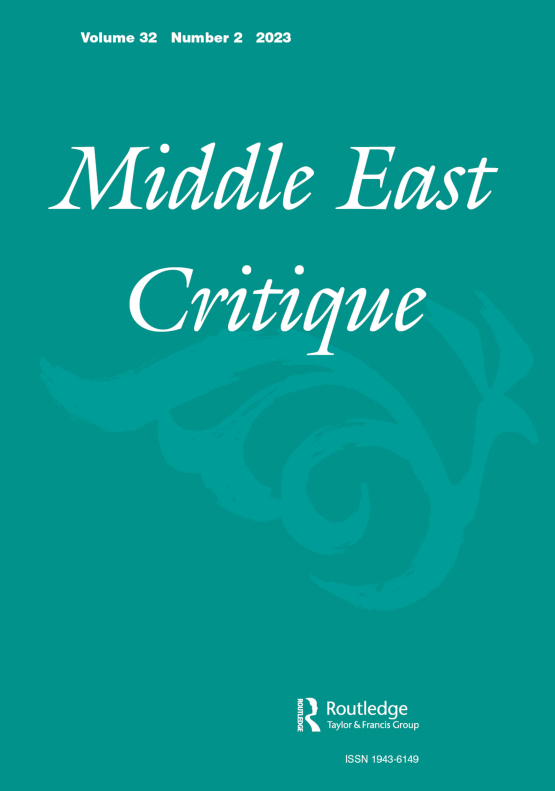Submit a Manuscript to the Journal
Middle East Critique
For a Special Issue on
The Politics of Knowledge Production in/on the Middle East
Abstract deadline
Manuscript deadline

Special Issue Editor(s)
Andrea Teti,
University of Salerno
gteti@unisa.it
The Politics of Knowledge Production in/on the Middle East
What are the epistemic and material conditions in which scholarly and public knowledge about the ‘Middle East’ is produced? What kinds of knowledge do these conditions inform? What are the scholarly and political implications of such productions? This Call for Papers invites contributions focusing on these themes in a range of national and disciplinary contexts, focusing on the epistemic characteristics of these productions and/or their material conditions, institutional configurations and political economies.
Outside epistemically and geographically Western-centric knowledge production, the Special Issue invites explorations of how the ‘Middle East’ is conceived in non-Western and/or non-positivist epistemological frameworks. What are the (politics of the) epistemic and material economies within which non-Western-centered forms of knowledge about the ‘Middle East’ are produced? In particular, the SI encourages contributions from Global Souths – material, geographical, and epistemic –, wherein Middle East Studies / West Asia & North African Studies have often very different genealogies compared to their orthodox, ‘Western’ counterparts.
Within Western-centred debates on knowledge production about the ‘Middle East’ there tends to be a focus either on Orientalism or on the so-called Area Studies Controversy. While post-orientalist scholarship has flourished, it has done so outside Social Science mainstream, which has remained unreceptive to both the specific substance and the standpoint of critiques of Orientalism. The limited extent to which these critiques have been received is the attempt in the Area Studies Controversy debate to ‘bridge the gap’ between orthodox, positivist Political Science, Comparative Politics and International Relations (PSIR) and heterodox, post-positivist Middle East Studies (MES). However, most likely because Orientalism and post-foundationalist critiques highlight the political impact of supposedly objective knowledge construction, these discussions rarely even include voices analysing epistemic dimension of this gap or how it is (re)produced, let alone take these criticisms seriously. Certainly, its steady flow of ‘pragmatic’ approaches has not dented publication patterns in mainstream PSIR journals that remain centred around positivist – often Orientalist – knowledge production on/about Middle East.
More recently, calls to decolonise knowledge production have become more insistent in MENA/SWANA scholarship. Besides remaining focused primarily on particularly urgent issues (i.e., Palestine/Israel), drawing on Postcolonial/Decolonial frame(s) is not itself unproblematic: even early critiques of Said’s Orientalism, of Postcoloniality and of Postcolonial Studies noted significant analytical weaknesses, including paradoxically re-centering Western forms of colonialism and modernity, naturalising forms of knowledge and power predating Western colonialism, and ‘Occidentalising’ the West itself. While advancing the understanding of how discursive/epistemic formations contribute to naturalising the hierarchies of worth, life and grievability central to imperialism, colonialism and neoliberal capitalism, these analyses often neglect the materiality, the political economies of the production and circulation of Orientalist knowledge. Ironically, the neglect of certain poststructuralists’ recognition of the importance of political economies – including Foucault’s – has proceeded in parallel to the marginalisation of this dimension in post-orientalist ‘area’ scholarship. Scholarship on and in non-Western contexts – including African, Latin American and Asian Studies – have long debated these difficulties.
This Special Issue discusses frontiers and possibilities in knowledge production on the MENA/SWANA in light of genealogies of knowledge production, both orthodox and critical, within and beyond the ‘West’. This CfP therefore invites contributions focusing on one or more of the following aspects of knowledge production on the ‘Middle East’:
· Epistemic conditions (i.e. Orientalisms, epistemic injustice(s), epistemicide(s), regimes of truth, etc.) to produce knowledge on the ‘Middle East’
· Material conditions / political economies of the production of knowledge
· The entanglement of knowledge production and practices / relations of power in scholarly and/or public/political/policy contexts
· Country/national and/or comparative national contexts.
Submission Instructions
Authors should submit a 300-word abstract and a CV by email to the journal’s editor, Dr. Matteo Capasso [critique.1992@gmail.com] and special issue guest editor, Dr Andrea Teti [managing.editor@gmail.com].
We aim for a special issue of 7-9 original articles, preceded by an introduction by the editor. Selected authors will be expected to submit an original article of 8,000-9,000 words.

